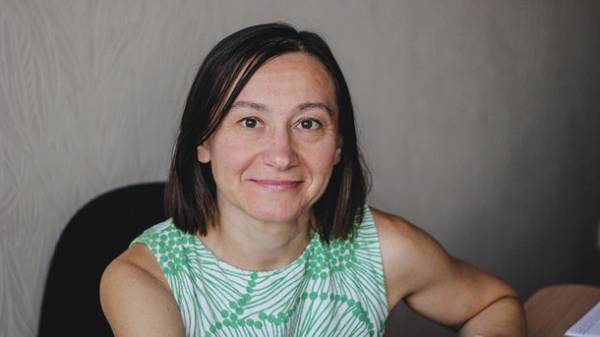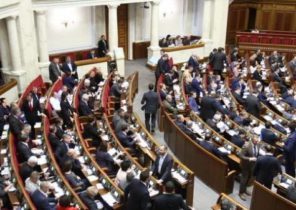
Next year in Ukraine can make new rules of retirement. In the framework of pension reform, the government proposes to convert old payment, to change the formula for calculation of pensions and to tighten the requirements for entering the “deserved rest” in 60 years. In an interview with the website “Today” leading researcher of the Institute of demography and social studies under national Academy of Sciences Lydia Tkachenko told about how and who can impact innovation and whether “reform,” to solve the problems of the Ukrainian pension system.
About the lack of PF, and new requirements
– A few weeks ago, the Prime Minister Volodymyr Groysman presented a draft of the pension reform in Parliament the document was registered under the name “On increasing pensions”. In the expert community very long awaited reform project. What are your impressions of the document?
– Is twofold. On the one hand, there are things you need to do. There is a list of measures that meet the General views on pension reform, the recommendations of international organizations, including the International labour organization (ILO), the International monetary Fund (IMF).
I am confused by the filing of the bill, information policy around it. First, a very strange name. It is common knowledge that pension reform is directed not on increase of pensions. Their goal is the stability of the system, its adaptability to changes in demography and the economy, to provide pensions not only today but for future generations of pensioners.
The ILO in its publications, States that current pension reforms almost always lead to lower level of provision of public/state pension systems. If you remember the recent Memorandum signed between Ukraine and the IMF, there is a direct commitment to reduce the long term pension costs by at least 3% of GDP.
“If you remember the recent Memorandum signed between Ukraine and the IMF, there is a direct commitment to reduce the long term pension costs by at least 3% of GDP. That is, the reform and increase of pensions – two different songs”
That is, the reform and increase of pensions to two different songs. If you look at the list of measures in the bill to increase clearly only two: 1) the October modernity, but it is in fact disposable, and 2) the new rules of indexation of pensions, but they are in automatic mode earn only from 2021, but in the next three years by decision of the government “given the financial possibilities of the budget of the Pension Fund”. This wording puts a lot of doubt in their implementation. As practice shows, the cost of the article, not accepted immediately, are not fulfilled then ever.
Modernity, to be held in October this year, perhaps the only thing that definitely will happen and that will really give increased pensions. All other measures do not directly imply higher pensions, even quite the contrary. For example, the abolition of special pensions or pensions on superannuation. I’m not saying it’s wrong, but is that a rise in pensions?
The downgrade of one year of experience in the pension formula from 1.35% to 1% will clearly lead to the fact that new retirees payments will be one-quarter lower than under the current rules.
The dissonance between the title and content of the bill is alarming, because it creates wrong expectations. And the information policy does not meet long-term goals. If you look at the advertising, you would think that the main achievement there is no direct decision on raising the retirement age. But this is not the essence of the reform and increase the age in the future can not escape.
– This year the deficit of the Pension Fund (PF) will reach 141 billion hryvnia, last year this amount was for several billion more. As calculated in the government, the implementation of the reform will eliminate the deficit in 7-10 years. You did your own calculations, how realistic is that?
– It all depends on what is considered a shortage. This bill proposes a significant redistribution of funding in the direction of increasing liabilities of the state budget. Of course, the lack of “own” funds PF will decrease. For example, the state budget will have to compensate for a reduced Ust rate for workers with disabilities paid pensions for years of service and fully cover the cost to Supplement the subsistence minimum to the basic pension amount calculated according to the formula.
Is what is called the unusual expenditures of the Pension Fund?
– Yes, in fact hell will be revised, consider these “unusual” expenses. From today’s 141,8 billion hryvnia, which flow into the PF from the state budget to the unusual includes all bonuses and raising for the victims of Chernobyl veterans and children of war, a higher rate of special pensions, any other government program – in total, almost $ 70 billion the Remaining 72 billion – the actual deficit, i.e. the lack of the revenues of ERUs for the payment of insurance pensions.
The budget is now financed only in part by guaranteeing a minimum pension. This, for example, to Supplement the subsistence minimum for people with disabilities to Supplement the fixed minimum 949 UAH for the old-age pensioners with an incomplete experience, etc. These guarantees are provided by a separate government decree.
But supplements those who a living wage guaranteed by the 28th article of the Law of Ukraine “On compulsory state pension insurance” (pensioners with full experience), now being made at the expense of the Pension Fund. The financial burden plan to transfer to the state budget.
If 141,8 billion to clean up any additional program and all charges for the guarantee minimum, the deficit of the Pension Fund is small. I.e. if the current “shortage” as much as possible just to transfer to the state budget, the Pension Fund already in the short term may be a surplus of his own money.
But this redistribution has its risks. The line between what is considered “peculiar” or “unusual” expenditures of the Pension Fund remains conditional, because the extent of the additional payments to the subsistence level depend on the future indexation of pensions. Will the more generous indexation of insurance pensions, the less money will you need to pay extra. If a higher rate will increase the cost of living will increase and surcharges, and with them the liabilities of the state budget. Most likely, the PF, and the state budget will try to save “their” money, and pensioners can be held hostage by these trades.
– That is, even if the deficit of the PF charged to pension expenses from the state budget can still grow?
– Elimination of shortage does not mean reducing expenditure on pensions in General. In this case it is rather the redistribution of financial obligations is quite controversial, especially given the changes in the formula. By October of this year, insurance pensions recalculated on the new base salary, the majority of pensioners, they will increase, that means additional payments to the subsistence level will decrease. But if in 2018, 2019 and 2020 will not be indexed for inflation and wage growth, very quickly the effect of modernization will come to naught, and the government will have much more to fork out payments.
“Elimination of shortage does not mean reducing expenditure on pensions in General. In this case it is rather the redistribution of financial obligations is quite controversial, especially given the changes in the formula”
If indexing will go each year, including the next three years, then, most likely, the PF will never be a surplus.
– One of the proposals in the framework of the reform is to gradually increase the required to receive the pension experience. Next year – 25 years, and each following year to increase it by 12 months, until a pension no longer will need to accumulate 35 years of experience. In the presentation of the Cabinet said that already in 2028-m to retire at 60 will be able to reach only 55% of Ukrainians. If there is no necessary experience, have to work until 63 or 65. You considered how many Ukrainians can’t “time” to retire?
– To make such predictions very difficult. What’s the problem? PF is personification only in the year 2000. Where people were before 2000, what the work book they will come, which will find documents, nobody knows. Do not have any surveys or studies.
In Soviet times most people, if not worked, then somewhere the work book kept. In the 90 years many businesses have collapsed, hardly worked, but formally they remained. For example, the collective finally abolished only in ’99. That is, we don’t know what “baggage” of experience will come the generation of those who in the coming years will be executed 60 years. Besides more stringent conditions of seniority, with verification of payment of contributions was introduced only since the beginning of 2004, and before that experience counted under the old rules. For example, people who managed to receive higher education prior to 2004, the study also counted towards seniority.
The more a person work experience since 2004, the more difficult it will be to fulfill this criterion. Those who will be 60 years after 2027, the need to have over 35 years of experience and a large part of their working lives will take place through a system of personifications of PF.
“The more a person work experience since 2004, the more difficult it will be to fulfill this criterion. Those who will be 60 years after 2027, the need to have over 35 years of experience, and a large part of their working lives will take place through a system of personifications of PF”
Rush if now people are to look for his official work, to demand that their employer is issued? This, of course, correct expectations. The idea is that people need to start to worry about their experience. But that is really hard to understand.
The experience of reforms in 2011, when it increased dramatically the required period of 10 years, showed that this gave a saving effect (by reducing allowance for excess length of service), but in terms of incentives for formal employment and contributions the result was not. Inflated, unattainable criteria of seniority on the contrary can be closed off from participation in the pension system.
General pension reform with legalization of employment and salaries should not be linked. It all depends on the situation in the economy, whether a person has a real choice where to work. General rule: if the economy grows, it comes out of the shadows. Because to develop better “vbeluyu”, especially if integrated in an international network. And when the crisis is a natural reaction – all go into the shadows.
– 35 years of experience for labor pension is not too high a requirement?
– In many countries put a maximum of 40 and even more years of experience. And if less, the pension is already reduced. And it may not just affect the size of pension, but even on the size of the state/of the basic pension paid by the state regardless of seniority. For example, in Denmark, Norway, Sweden, Finland, Iceland, Canada, Australia, New Zealand if you have lived 40 years in the country – you are given that this sum, if spent less, this amount is proportionately reduced.
– Ukraine plans to enter the 12 grade in schools. As a result, the students will be 18-19 years old. Plus another five or six years of study at the University. Doctors are learning more. Students in the Labor code issue is very rare, even if they work in parallel, to accumulate experience and study hard. Wouldn’t the requirement in 35 years of experience to ensure that, for example, doctors will not earn as much experience and will default to retire at 63 or 65 years?
– It can really be a problem. Higher education is at least four years of study, and if with master’s degree plus a year or two. Further studies, any internships, and generally breaks associated with the change, they are the place to be. It turns out, people physically will not have time 60 years to earn 35 years of experience. “Corridor” retirement age and it is designed. So many were not “first”, but at least the “second” door, and push the actual age of retirement.
But for students is correct to make more loyal to the rules of seniority. Now, many students work part time, particularly at the undergraduate level. This is not even with the fact that families do not have money, it is the objective need of the labor market: youth small, working-age population is shrinking.
Very often students do not work on a speciality and without registration. It is necessary to restore order. There may be different methods. In many countries, the USA, for working students even have lower minimum wage. This is done to ensure that employers are not so expensive them to formalize. A sort of “discount” to employers. The main thing that was all legally registered.
– You said that the “corridor” made in order to hit a “second door” – retired in 63, or even “third” – in 65 years. If you really retire, many Ukrainians will be later, is it possible to say that the retirement age is not raised?
Is the increase in so-called effective retirement age. There is a statutory retirement age, and there are various flexible or not ways like this age of “push”. It seems like to make people late to retire, but the number “60” to save. The number remains, but not all of it shines. And many of real looms “63” and “65”.
I’m actually a proponent of raising the retirement age. I think it’s more direct and clear way. Then everything is clear, people know your age, you know, when they retire. With experience there is no such evidence.
– What about those Ukrainians who did not earn the necessary experience to retire at age 60? What fate awaits them?
– The bill for 2018-2020 provided for the appointment of temporary social assistance for those people who first came into the hallway and have at least 15 years of experience. They reached 60 years, they don’t have enough experience under the new criteria, but they will have the right to obtain temporary relief – up to 63 or to 65 years, and then they will receive their normal retirement pension.
However, here too there are risks, and much depends on how PF behaves. For example, someone lucky to be born 2 Jan and him in 2018 will be 60 years, but it’s not nearly 25 years of experience, there are only 15. Suppose a person comes to the pension Fund retirement, and he will answer: “Sorry, new rules, and to retire at 60, you have 25 years of experience, and you are only 15, you have no such right. If the person himself not sufficiently versed, he may think that it all deprived. PF should develop detailed instructions for their employees how they should act, so that people are not left without anything.
– Such assistance will be eligible those who have 15 years of experience. And what about the rest?
– The rest and now I can not receive pension at 60 years. They can receive state social assistance. It’s not really retirement, they are no longer to assign since the reform of 2004. The main difference is that a social pension could be obtained at the same age as the normal retirement pension. State social assistance for persons who have reached retirement age, but has not acquired the right to pension, is now assigned 63 years (3 years later normal pension age), and will be on the bill, s 65 (5 years later).
In addition, we have the law on social assistance to the poor. If the person is retirement age for any reason can not qualify for a retirement pension or its amount less than minimum wage, he can address in bodies of social protection, given the available income to receive cash assistance.
About the size of pensions and modernization
Last year Ukraine signed the 102nd Convention of the ILO, according to which the pension can not be lower than 40% of the previous earnings of the beneficiary. Given that the coefficient estimates of experience are reduced and the new pension will be lower if we can implement this Convention?
– It’s hard to say for sure. International law is written so that specific national legislation can be interpreted in different ways. This Convention Ukraine last year, ratified the 6th of June this year she became part of our national legislation. There is criticism that the Convention of 1952 and much has since changed. For example, a typical recipient of old-age pension in the Convention is considered to be a man on the content of the wife retirement age. Ie the 40% of earnings was intended as if for two. And since most women already earn their own pension, dependants of pensioners, as a rule, is not, therefore, guaranteed 40% and you can knock off.
If to consider the bill strictly in the key of the Convention, there is a lot of questions.
For example, the Convention defines the right of retirement as the achievement of advanced age, the binding is not the length of service and disability. Experience is only mentioned as one of the criteria for determining the amount of payment. That is, the corridor of the retirement age here as it does not fit as the criterion of 35 years of experience. The Convention referred to the largest length of service – 30 years is enough to get a full pension. We have the same men should have 35 years of experience to qualify for the minimum pension to the subsistence minimum. Agree, there is a difference between the full and minimum size.
– If the formula for calculating pensions, as stated in the draft reform, to change, at a salary 1.5 times above the national average, at the moment it is about 10 thousand hryvnia, and 30 years of service the pension is less than 1700 hryvnias. Thus the social contribution of the salary – 2200 hryvnia. It turns out that in that situation, you will have the replacement rate, i.e. the percentage of their income in retirement, at the level of 17% of their salary?
– Of course, the replacement rate is 40% is not reached. The irony is that the greatest compensation in procentach his earnings given to those who pay minimum contributions.
“The irony is that the largest compensation percentage to your earnings given to those who pay minimum contributions”
You need to understand that the size of our pensions depends on the capabilities of public Finance. There is money – and pay increases, no money – freeze. This is the biggest problem – when we work, we do not think how we will live in retirement. And when we leave to retire from us nothing depends.
The EU is constantly emphasize that any pension system requires solidarity. You have to understand that work and make contributions not only to ensure that in the future to retire, and to your grandparents, elderly friends have received adequate pensions. You need to understand that these contributions are spent in the here and now. You only acquire rights, and those rights are issued in experience, in the ratio of earnings at some percentage of the yield.
But in the pension formula, there are always parameters which are determined by the state. The state manipulates these parameters to reduce the debit with credit, and present pensioners to pay something, and working to leave something.
– One of the most enjoyable aspects of the reform of 5.6 million pensions “asurement”, will increase from 50 to more than 1000 UAH. In Ukraine, the 12 million pensioners, “savremena” paying only half of them. Why not all pensions will grow?
– The figure of 5.6 million people was called before it was decided to move the increase of the minimum pension for two months (December to October). Since the minimum pension will rise also in October, someone her height will block the result of “modernization”.
PF mentioned that about 3 million people will receive an increase to their pensions owing to the increase in the minimum size.
– And who is generally not affected?
– Remains of about three million pensioners, who in October did not receive any allowances. First of all, people who retired in the last three or four years: in 2014, 2015, 2016 and 2017. They have a base salary not so much outdated, but if you count with a reduction in the estimate one year of experience, the insurance part of their pensions will be even lower than it is now. They certainly will not reduce the total amount of pension, but additional money as a result of modernization, they will not receive. In addition, new pensioners basic amount of pension, as a rule, more than the subsistence minimum, i.e. the revision of minimum pension, they too will fail.
– Considering that after the pension reform, all new pensions in the solidarity system will be a quarter below, the question of the introduction of funded pensions is even more urgent. Some saw the pension reform as a running cumulative of the second level, but in the bill about it not a word…
– We cannot say that the introduction of funded pensions entirely refused. At the end of the bill there is a clause that within six months the government must develop a system of occupational pensions, which are expected to be cumulative.
In General, the bonus program is really great, they are very necessary. It is quite another status of the pensioner. If now our seniors are sitting and waiting for the government decides to increase pensions, listening to, who their contains and how they are costly, in the storage system, they will have a “capitalist” income, almost like investors. Pensioners would be on the sidelines, and in the center of economic life.
But if the second level to make public, as prescribed in the existing legislation, it makes no sense. No wonder the IMF is strongly against such a second level. If it is public, then all the problems of the solidarity system will go to the second level. The state is the same, the quality of controlling the same, the money’s the same. If you put money on Deposit in state banks or in government securities, as suggested, …it could all lead to an increase in domestic public debt and real investment will be. As experience shows, the money from the sale of government securities usually go to current state needs. And not in profitable investment projects, which in the future can give the cash for payment of savings and pensions..
– Than you earn on the pension funds in countries where they have been working? In the stock market?
– Yes, mostly stocks and bonds, not necessarily the state. When they say that the memory system is a source of investment in the economy, it makes sense, when there are companies whose shares you can buy. We have the stock market was never blossomed, and now there is almost no one left. However, there is also a global problem: large industrial corporations themselves are becoming obsolete, and to replace them there is nothing.
– One suggestion: allow Ukrainian pension funds to invest abroad. How do you feel about that?
For small countries, where there are few contributors and the amount of money is small, this is OK. Ukraine is a large country, it’s a completely different scale. Moreover, as shown by recent financial crises, there is a large excess of investment money, including pension. Options for investment with acceptable risk becomes smaller.
– Do you believe that someday Ukraine will have to work successfully funded system?
– What to do? Of course, now there is a huge risk that the money can easily steal. With the same investment abroad. We have it may be another offshore company – so the money will withdraw that can’t find it. But you need to learn to see perspective.
“This bill should be seen as another episode of the pension reform. It is fundamentally the problem can not solve. In General, pension reform is a terrible routine, because here’s a quick results do not happen”
This bill should be seen as another episode of the pension reform. It is fundamentally the problem can not solve. In General, pension reform is a terrible routine, because here’s a quick results do not happen. The most sensitive issue – we realize that future retirees will receive pensions later and less. But will this better the life of today’s elderly – while there are no guarantees.







